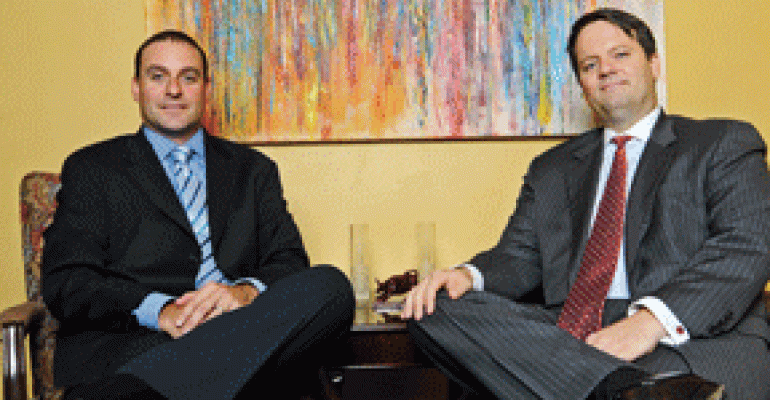
Firm: Wells Fargo Advisors
Ages: 40 (Dermer), 37 (Eaton)
Location: New York City
Years with firm: 3
Years in the business: 19 (Dermer), 15 (Eaton)
Business specialty: Corporate cash management
In the mid-1990s the investment bank Hambrecht & Quist was signing up wealth managers for corporate clients who were looking for useful places to park the cash on their balance sheets. They recruited Matthew L. Dermer to set up a team; Dermer, who had been selling securities with Oppenheimer, hired Jesse M. Eaton from the municipal bond section at Lebenthal two months later. The two men shared a common career philosophy, Dermer says: “We're going to work extremely hard at one thing and figure out how to do it very well.” They're still managing corporate cash, now with Wells Fargo Advisors, with combined assets under management of nearly $3 billion.
H&Q had been doing IPOs for young companies that needed investment advice. “You would be speaking to a company that had just raised $400 million that had a CFO and, at best, maybe an assistant treasurer, as their entire treasury staff,” Dermer recalls. Eaton says the investment bankers were looking at corporate cash “as an incredibly useful relationship enhancer between transactions,” one that would keep the clients close to the bankers until they needed to do another offering.
Corporate clients mostly had two choices, as Dermer and Eaton put it: pricey asset managers or institutional brokerage platforms whose one-size-fits-all securities such as three-year Treasuries may not have meshed with a particular business' cash flow needs. They see the middle ground as offering an opportunity for someone with a service model — and a talent for meticulous client management. A typical advisor manages an individual, but Dermer and Eaton have to sell to multiple levels, from an assistant treasurer to CFO to board member.
“You have to play error-free ball,” Eaton says. A bad investment outcome may mean more than lost income; it could get an executive client fired. But good relations can produce repeat business as executives move from company to company. “You wind up with a very good referral base. The institutional community is pretty incestuous,” Dermer says.



